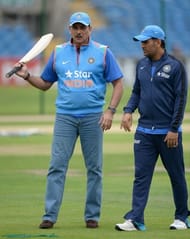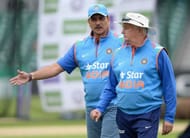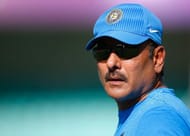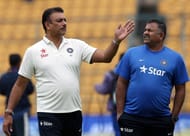
When Ravi Shastri was appointed the coach of the Indian cricket team last year, there was hardly anyone advocating the Cricket Advisory Committee’s decision.
How could they? The CAC had picked a man to fill the boots of another man (Anil Kumble) who was far superior to him as a “cricketer”, and the cliché says that the playing abilities of a person are directly proportional to his coaching abilities, that great players necessarily make great coaches and average players can’t.
Apart from clichés, we, the fans are also obsessed with numbers. Not that I personally see cricket in the light of numbers, but India’s results in various series across formats since Shastri has taken over as full-time coach have been 3-0, 5-0, 1-0 (Sri Lanka), 4-1, 1-1 (Australia), 2-1, 2-1 (New Zealand), 1-0, 2-1, 3-0 (Sri Lanka), 1-2, 5-1, 2-1 (South Africa) and 4-1 (Nidahas Trophy).
Shastri is not one of those coaches who is in fashion in this day and age. He doesn’t carry a notebook which is perhaps the only way of making people believe that the coach is having a close look at the affairs. He doesn’t animatedly wave at his players from the sidelines or the dressing room, he doesn’t send too many messages to the captain on the field either, yet he is in complete control and his team is playing exactly the way he wants to. Why and how?
Here are 5 points from Ravi Shastri’s book of cricket coaching:
#1 No opposition is big enough, no opposition is small enough

Complacency and panic are the two things which might affect your morale even before you step onto the field. Complacency creeps in when you take your opposition for granted and panic creeps in when you overhype your opposition.
Shastri has made sure the quality of the opposition is not a topic of discussion in the Indian dressing room. The mantra is simple – We will play whoever comes across and beat whoever comes across. Both, Bangladesh and South Africa, are in the same bracket in Shastri’s book regardless of whatever their actual qualities might be.
#2 No over-emphasis on the conditions

The Indian think-tanks in the past have made the mistake of overthinking the overseas cricket. Not that Shastri doesn’t value overseas cricket, but he doesn’t undermine home cricket because of it. For him, a victory at home and a victory overseas is in the same bracket.
Whenever he has spoken about India’s run in the 2017-18 season, he has mentioned all the series, starting from the Sri Lanka tour to the home series against Australia, New Zealand, and Sri Lanka, and then, of course, the historical South Africa tour as well. However, there hasn’t been any separate talk of the SA tour in particular and the fact that he doesn’t over-emphasize overseas cricket puts less pressure on the players when they go on abroad.
#3 The Captain is the boss

Shastri believes in the good old theory of letting the captain take centre-stage rather than imposing himself as the chief decision-maker, unlike a few other modern-day coaches who are trying to model cricket coaching on Football management. Cricket is a sport where instinctive decisions need to be taken by the captain on the field, therefore, the captain will always be the boss of the team.
A cricket coach is there to take the burden off the captain’s shoulders and that’s what Shastri is doing. Working on the mental aspect of the players, making them buy into the captain’s mentality, and explaining to them how the captain’s brand of cricket is the correct brand for the team, all to fetch long-term success.
#4 No compromise on fitness

When MS Dhoni was the captain of the Indian team, he came with this theory of “controlling the controllable” and Shastri has absolutely embraced it. The Yo-Yo test is now compulsory for the players. You have to have a certain degree of strength in your body to make sure you are controlling the controllable, else you are not making it to the team. It’s as simple as that and there is zero tolerance for it.
What are the controllable in cricket? Converting runs while running between the wickets, covering distances quickly while fielding in the outfield, diving efficiently both forward and sideways, and maintaining balance while catching close to the fence in the deep.
Do any of these depend on the opposition’s quality? No. They all depend on one's fitness. If you have what it takes in terms of fitness, you are controlling them all and at all times.
#5 No outside influence

In sports or in life in general, hate affects you more when you let the love affect you first. If you don’t care about someone’s love, it doesn’t matter if they hate you at some stage. The Indian fans have this tendency of turning a player from hero to villain in a space of few days and this affects the players when they get too much into this feeling of being portrayed as a hero.
That’s the first thing Shastri has removed from their system. "Don’t care about what the fans are saying outside - they will worship you and they will thrash you as per their mood and convenience – you have to turn a blind eye. Your job is just to play cricket to the best of your abilities. That’s it." These were the exact words of the Indian captain Virat Kohli as well when he spoke to the press after the ODI series in South Africa and needless to say who those words were inspired by.
The message is clear to the players. What matters is what the management thinks about them and what they feel about their game. Anything and everything being written or said outside, with or without bias, is irrelevant.
It goes without saying that with all these simple, yet effective philosophies, Shastri is writing his own legacy as India coach.
Follow IPL Auction 2025 Live Updates, News & Biddings at Sportskeeda. Get the fastest updates on Mega-Auction and cricket news
